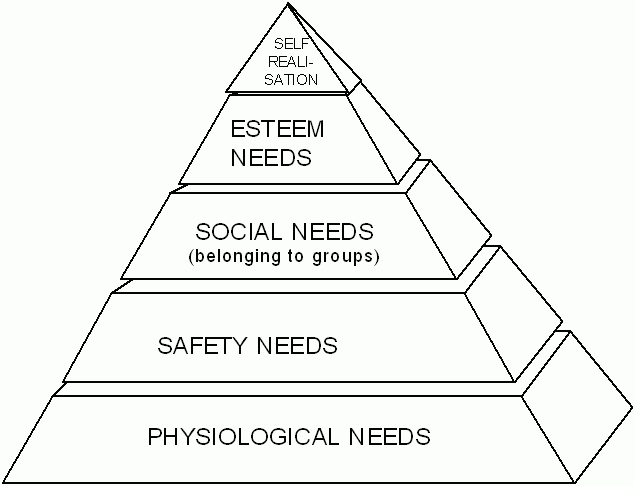Maslow’s model of human needs
Category: Staff’s Motivation
Maslow’s hierarchy of needs
Motivation theories suggest that man has a “package” of needs: the best way to motivate an employee is to find out what his needs are and offer him rewards that will satisfy those needs.
One of the most commonly accepted theories is A. H. Maslow’s “hierarchy of needs”.
The starting point of his theory is that most people are motivated by the desire to satisfy specific groups of needs. Abraham Maslow saw human needs at various levels.
The theory rests on the basic assumption that individuals are in a constant state of motivation and never achieving a state of satisfaction except for a very short time.
People are therefore motivated by constantly unsatisfied and changing needs.
Abraham Maslow identified five innate needs of all individuals and arranged them in a hierarchy, suggesting that an individual will be motivated to satisfy each category, starting at the bottom, before going on to seek “higher order” satisfactions.
The pyramid of needs by A. H. Maslow
Maslow hypothesised that, within every human being, there exists a hierarchy of needs. These are: physiological, safety, affiliation, esteem and self-actualisation.
— Physiological includes hunger, thirst, shelter, sex and other bodily needs.
— Safety includes security and protection from physical and emotional harm.
— Affiliation includes belongingness, acceptance, friendship, affection and love.
— Esteem includes internal esteem factors such as self-respect, autonomy and achievement and external factors such as status, recognition and attention.
— Self-actualisation: the drive to become what one is capable of becoming includes growth, achieving one’s potential and self-fulfilment.
As each of these needs becomes substantially satisfied, the next need becomes dominant.
Maslow arranged human needs into the following classes (see diagram below):
Maslow’s hierarchy of needs
Physiological or basic needs
The most basic human instinct is survival. It follows therefore that people’s most basic needs are those that arise from that instinct, i.e. Food, Drink, Sleep, Etc. and until they have been satisfied they will override any higher needs.
Safety or security needs
These are concerned with self-protection, with the avoidance of harm and, to some extent, with provision for the future. Examples are the needs for shelter, warmth and self-defence. At work the wish for security of tenure, the existence of insurance and pension schemes. Safety and Security needs are based on establishing a stable environment, relatively free from threats.
Social or belonging needs
Everyone, in various degrees, wishes to give and receive friendship. These needs are based on relationships with others and include acceptance, friendship, good working relationships, and companionship.
Esteem or status needs
These needs include responsibility, achievement, title, confidence, reputation and promotion. Status needs are based on capability and the respect generated from others.
Self-realisation or self-fulfilment
This final group comprises the needs to make the fullest use of one’s capabilities, to develop oneself and to be creative. In the working environment the majority of employees find few opportunities to satisfy needs in this class — job satisfaction — and often these needs are satisfied outside work e.g. sport, hobbies, pastimes, etc.
Maslow has suggested that the classes of needs, in the order shown, form a hierarchy. Thus people tend to satisfy their needs step by step, starting with the basic needs, and then moving up the hierarchy. If anything threatens our lower need, we concentrate on correcting these before moving upwards again. Sometimes, as one need is satisfied on one level, another need arises on the same level. Maslow’s theory has been criticised on the following grounds:
The theory asserts that people seek to achieve higher-level needs after lower level ones have been fulfilled. Yet some individuals need strong desires to gratify higher level needs before lower level needs have been fully satisfied. For instance, a poor person may yearn for status symbols even though his or her immediate physical and security requirements have not been properly met.
Individuals might not rank the various types of need in the manner suggested. For some men and women, esteem needs are more important than needs for affection.
Indeed, some of the needs in Maslow’s hierarchy might not exist in certain people; and what one person considers essential might be trivial to someone else.

